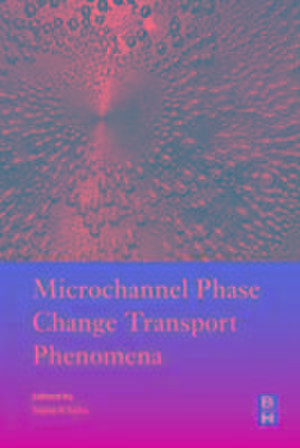Microchannel Phase Change Transport Phenomena
Autor Sujoy Kumar Sahaen Limba Engleză Paperback – 28 sep 2015
This book offers the latest research and recommended models on the microsize cooling system which not only significantly reduces the weight load, but also enhances the capability to remove much greater amount of heat than any of large scale cooling systems.
A detailed reference in microchannel phase change (boiling and condensation) including recommended models and correlations for various requirements such as pressure loss, and heat transfer coefficient.
Researchers, engineers, designers and students will benefit from the collated, state-of-the-art of the research put together in this book and its systematic, addressing all the relevant issues and providing a good reference for solving problems of critical analysis.
- Up-to-date information will help delineate further research direction in the microchannel heat transfer
- The latest modeling information and recommendations will help in design method and purpose
Preț: 510.56 lei
Preț vechi: 561.06 lei
-9% Nou
Puncte Express: 766
Preț estimativ în valută:
97.73€ • 102.67$ • 82.13£
97.73€ • 102.67$ • 82.13£
Carte tipărită la comandă
Livrare economică 04-18 martie
Preluare comenzi: 021 569.72.76
Specificații
ISBN-13: 9780128043189
ISBN-10: 0128043180
Pagini: 356
Dimensiuni: 152 x 229 x 20 mm
Greutate: 0.48 kg
Editura: ELSEVIER SCIENCE
ISBN-10: 0128043180
Pagini: 356
Dimensiuni: 152 x 229 x 20 mm
Greutate: 0.48 kg
Editura: ELSEVIER SCIENCE
Public țintă
Engineers, Researchers, Designers, Students, Could be used as a reference in graduate-level or PhD studiesCuprins
Introduction
Scale differentiation
Flow pattern with bubble growth
Heat transfer with models
Pressure drop
Instabilities
Onset of nucleate boiling
Void fraction
Liquid film thickness
Critical heat flux
Condensation and boiling enhancement
Convective condensation
Predictive methods
Conclusion
Scale differentiation
Flow pattern with bubble growth
Heat transfer with models
Pressure drop
Instabilities
Onset of nucleate boiling
Void fraction
Liquid film thickness
Critical heat flux
Condensation and boiling enhancement
Convective condensation
Predictive methods
Conclusion
